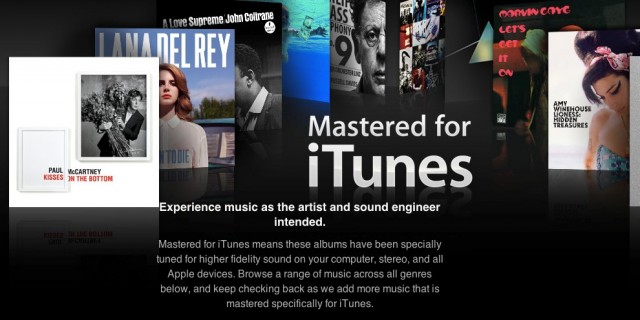I’ve been listening to quite a few new tracks from iTunes under Apple’s new “Mastered for iTunes” program. This is something Apple voluntarily started to help improve the audio quality of the music we download from iTunes. From my perspective, it’s great, but Apple has received some self-indulgent criticism in some circles.
For instance, a Web site in the UK wrote an article refuting claims that Mastered for iTunes sound quality was comparable to CDs. The Web site even went so far as to make a video using null testing to prove its point.
Here’s the problem. Apple never said that Mastered for iTunes was CD-quality at all. The Web site later updated its posted admitting that one of its commenters, not Apple, made the comment about CD quality.

From what I can see, Apple only wants to provide the highest quality audio it can. What can possibly be wrong with that? The simple answer is nothing.
Here’s what Apple’s mission is in the Mastered for iTunes program as I understand it.
Provide better quality audio to its customers
Give mastering engineers tips and tools to submit the best quality audio possible to Apple
Make sure that audio professionals are optimizing content for the digital medium.
Apple is now accepting high-quality masters from engineers because its new encoders can preserve more dynamic range, resulting in better quality music for the consumer to download.
Mastering engineer Bob Ludwig (Coldplay, Bruce Springsteen, Nirvana, Soundgarden) told me that Apple spent 18 months investigating how to make the AAC encoder better. The results, he says, are “a great thing.”
Ludwig explained that in the past, AAC songs were ripped from 16-bit CDs, but now Apple can handle higher resolution files. In fact, Apple says an ideal master will have 24-bit 96kHz resolution, but sample rates of 48kHz, 88.2kHz, 96kHz, and 192kHz can also benefit from the encoding process.
The creative part of the mastering process hasn’t changed one bit with the Mastered for iTunes program. Ludwig said he masters his music exactly the same way. The change comes after the creative process is finished — that’s where Mastered for iTunes comes in.
Instead of sending it to CD and then having the AAC files ripped from that, mastering engineers can now use Apple’s tools to create custom AAC files from the high-resoultion master.
Apple even documents the trend towards louder mastered music, commonly referred to as “the loudness wars” and offers tips and advice. With music being so loud these days, running a song through any encoder will often cause clipping — it’s the nature of encoders. However, one of the tools Apple provides to engineers allows them to check the AAC files for clipping and then make adjustments before the songs are sent to iTunes.
Some people think that mastering for a digital format is silly, but it’s downright stupid to ignore iTunes. Apple is the largest distributor of music and if you don’t think that improving the quality of your music for millions of people, then you don’t really care about your fans.
As a musician and a music lover, I’m in favor of any process that captures more dynamic range of the music I’m going to buy. It’s a good thing for everyone involved, but most especially for the consumers that purchase and listen to the music.
Engineers and musicians should embrace better-quality digital music, not fight about frequencies and philosophical differences in the process. Your customers will thank you for it.
